A list of thought-provoking existential questions categorized by theme: life, death, meaning, purpose, suffering, love, freedom, and more!
What is the meaning of life?
Is there a higher purpose?
Are we truly free, or are our choices predetermined?
These are topics that have haunted philosophers for centuries, and they likely linger in the back of your mind too.
Existentialism, at its core, is about grappling with these fundamental questions of existence. It’s about confronting our mortality, finding meaning in the face of absurdity, and ultimately, defining our own purpose in a universe that often feels indifferent.
In this article, we will go over a list of 60 existential questions categorized by theme. Whether you’re seeking to understand yourself, engaging in meaningful conversations, or simply pondering the mysteries of life, these prompts should challenge your assumptions and spark insightful reflections!
Highlights
- The list below covers a wide range of themes, including life and death, meaning and purpose, suffering, self, love and relationships, freedom and responsibility, time, the universe, religion, AI and consciousness, and more.
- The prompts are categorized so that one may either focus on specific areas of interest or delve into the broader philosophical landscape.
- In addition, an FAQ section is also featured to address some common questions about existence and encourage readers to find their own unique perspectives on life’s biggest mysteries.
Existential Questions About Life & Death
This section explores the mysteries of existence, from the enigma of birth to the inevitability of death. Let us delve into humanity’s deepest fears and hopes about what lies beyond life and how we come to terms with our mortality!
- What happens to us after we die?
What happens after death is a topic that has haunted humanity since we first became aware of our own mortality. Some believe in an afterlife, a continuation of consciousness in another realm – while others find solace in the idea of returning to the universe, our energy becoming part of the cosmos once more. Ultimately, the answer remains a mystery, a deeply personal question each of us must grapple with in our own way.
- Why were we born, and does it have a reason?
Perhaps there is no grand, preordained reason, and our presence is simply a fleeting moment in the vastness of time. Or maybe, the meaning lies not in a predetermined purpose, but in the experiences we gather, the connections we forge, and the impact we have on the world around us. It’s up to each of us to discover and define our own significance.
- Can life have meaning without death?
The finitude of our lifespan means that we need to think carefully about our choices and how to spend our limited on Earth. At the same time, reflecting on it also serves as a reminder of the importance of relationships, experiences, and contributions to society.
- Is immortality desirable or terrifying?
While the idea of escaping death’s grasp might seem appealing, it also raises questions about the potential for endless suffering, the weight of witnessing the world change beyond recognition, and the possible stagnation of personal growth. Perhaps the true value of life lies in its finite nature, giving each moment a precious and irreplaceable quality.
- Do we truly live, or are we just passing through life?
Are we active participants in our own lives, shaping our destinies with every choice we make? Or are we merely passengers on a predetermined journey, watching the scenery of life unfold before us without truly engaging with it? Maybe the answer lies somewhere in between, a delicate balance of free will and fate, where we are both the authors and the readers of our own stories.
The greatest hazard of all, losing one’s self, can occur very quietly in the world, as if it were nothing at all.
Søren Kierkegaard, ‘The Sickness Unto Death‘

Existential questions examples
Read more: 45 Mindfulness Questions – Daily Check-in Prompts for Better Clarity
Questions About Meaning & Purpose
The questions below tackle the human quest for meaning in a seemingly indifferent universe. They probe whether purpose is something inherent in life – or something we must create for ourselves.
- Is meaning something we create or something we discover?
It’s very likely to be a blend of both: we discover meaning in the connections we forge, the values we embrace, and the world around us, while simultaneously creating meaning through the lives we choose to lead.
- If life has no inherent purpose, how do we cope with that realization?
Many people throughout history have come to the same conclusion. The question of how to cope with the realization that life has no inherent purpose is a personal one; and yet, what’s important is to focus on what you have control over – your own actions, choices, relationships, work, and hobbies. Think about them, and you may soon arrive at a solution for yourself!
- Why do we seek meaning in everything we do?
Perhaps this inherent drive to find meaning stems from our awareness of mortality, a way to leave a mark on the world before we fade away. Or maybe it’s a fundamental human need, a desire to understand our place in the grand tapestry of existence – and to feel that our lives have significance beyond mere survival. It could be that seeking meaning is what truly makes us human, driving us to create, connect, and explore the depths of our own being.
- Are some lives more meaningful than others?
It’s tempting to measure a life’s value by its impact on the world, the accolades received, or the historical mark left behind. Yet, meaning probably isn’t a quantifiable metric, but rather a deeply personal experience. A life lived with love, kindness, and genuine connection, even if unknown to the wider world, could hold just as much significance as one filled with public achievements. The quiet moments of joy, the strength found in adversity, and the bonds shared with others – these are just among the few things that make one’s existence truly matter!
- Is a meaningless life still worth living?
If we define “meaning” as a grand, cosmic purpose, then many lives may appear worthless from a detached perspective. However, even without a preordained destiny, a life can be filled with moments of joy, connection, and personal growth. In other words, its value lies not in some external validation, but in the simple act of experiencing it, of navigating its complexities and finding beauty in its fleeting moments.
The struggle itself toward the heights is enough to fill a man’s heart. One must imagine Sisyphus happy.
Albert Camus, ‘The Myth of Sisyphus‘
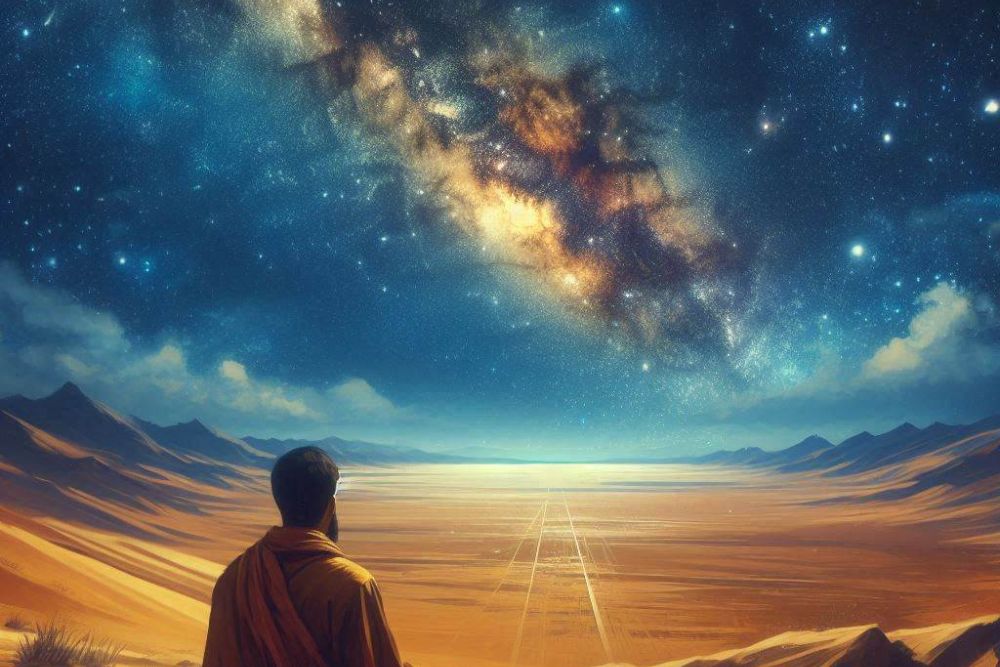
Questions About Suffering
This section examines the role of pain and hardship in human existence – whether suffering is essential for growth, a random occurrence, or something that can be eradicated entirely.
- Does suffering have a purpose or is it purely random?
Suffering is an undeniable part of the human experience, and we often grapple with the question of its origin. Is it a test, a lesson, a necessary catalyst for growth, or simply a cruel twist of fate, devoid of any inherent significance? While we may never arrive at a definitive answer, we can choose how to respond to adversity. Even if the suffering itself seems random and unjust, one still has the power to confront it with dignity and compassion.
- Is a life without suffering a meaningful life?
The absence of suffering might seem like an ideal state; that being said, how would we truly understand joy, resilience, and growth without experiencing hardship? Quite often, it is through overcoming challenges and navigating difficult emotions that we discover our inner strength and develop empathy for others.
- Why do we often find wisdom in pain?
Pain, whether physical or emotional, forces us to confront our weaknesses and reassess our priorities. It strips away superficialities and compels us to look inward, often revealing hidden strengths we never knew we possessed. It is in these moments of vulnerability that we gain a deeper understanding of ourselves and the world, forging wisdom from the crucible of experience.
- Can we eliminate suffering without eliminating humanity?
While we can (and should) strive to alleviate unnecessary hardships, particularly those caused by injustice and cruelty, the complete eradication of all forms of suffering might fundamentally alter what it means to be human. After all, it is through overcoming obstacles that one may grow and appreciate our shared humanity.
- Is happiness achievable, or is suffering inevitable?
The human experience seems to be a delicate dance between joy and sorrow, a constant ebb and flow of positive and negative emotions. Perhaps true happiness isn’t a permanent state of bliss, but rather the ability to navigate these contrasting experiences with resilience and acceptance.
My contemplation is an excruciation only because it is also a joy. I can not appropriate the snow field where I slide. It remains foreign, forbidden, but I take delight in this very effort toward an impossible possession. I experience it as a triumph, not as a defeat.
Simone de Beauvoir, ‘The Ethics of Ambiguity‘
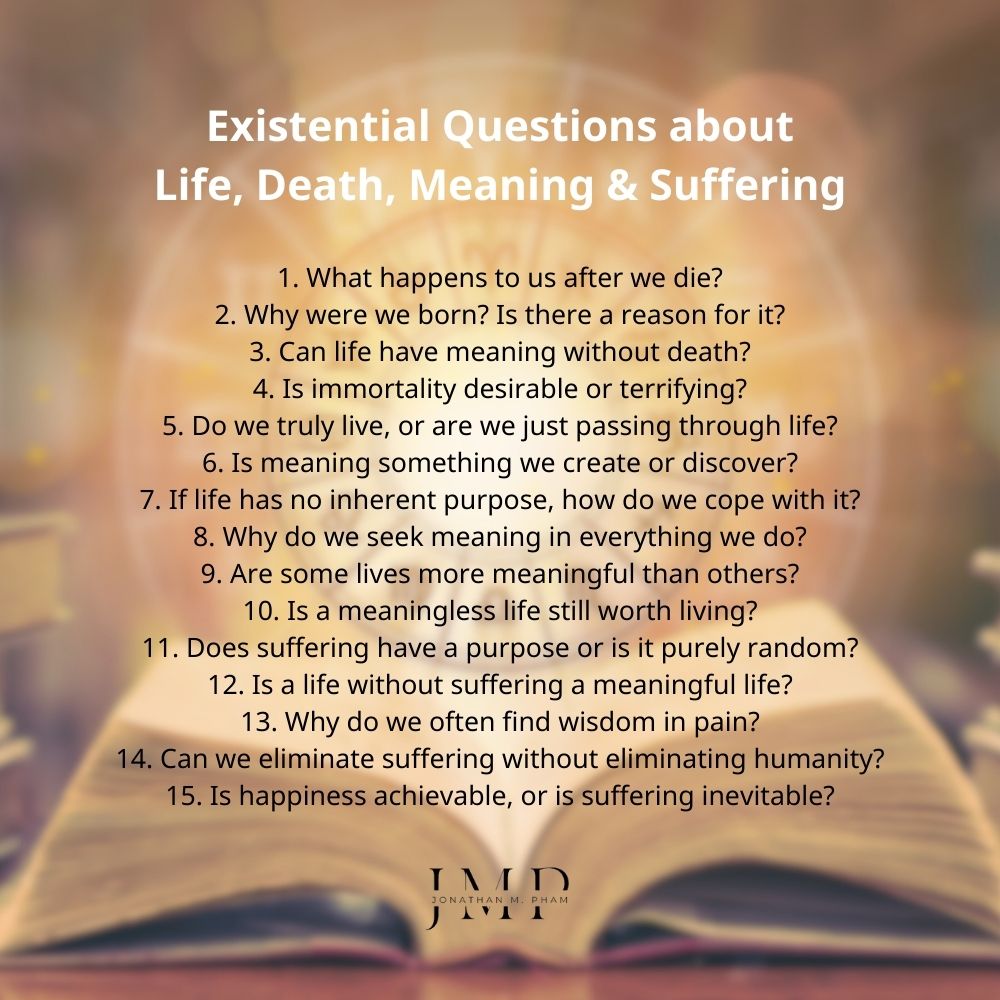
Existential questions about the human condition
Existential Questions About Self
Who are we? Below are prompts that deal with identity, self-awareness, and the nature of personal existence, challenging the boundaries between the self and the external world.
- Are we defined by our choices or our circumstances?
Quite often, our true character is revealed not only in the choices we make – but also in how we respond to the circumstances we are given, demonstrating resilience, adaptability, and the capacity for growth even in the face of hardship.
- Do we truly have a self, or is it an illusion?
The concept of a fixed, unchanging “self” has been debated for centuries. Our experiences, relationships, and even our physical bodies are constantly changing, so what, if anything, remains constant?
- If you lose your memories, are you still the same person?
Memories form a significant part of our identity, shaping our understanding of the world and our place within it. They provide context for our emotions, relationships, and learned behaviors. So, if those memories vanish, a fundamental aspect of who we are is undeniably lost. Yet, perhaps a core essence remains, a unique spark of consciousness that persists even without the narrative of the past. In other words, while altered, something of the original person endures (hence the need to treat everybody with dignity).
- How much of who we are is shaped by other people?
From the earliest years of childhood, we are constantly influenced by the people around us: families, friends, and the broader society in which we live. We learn through observation, imitation, and the feedback we receive from others. These interactions shape our beliefs, values, and even our sense of self. To put it simply, our identities are not formed in isolation, but rather in a complex web of relationships and shared experiences.
- Can we ever fully know ourselves?
The journey of self-discovery is a lifelong pursuit, a constant process of exploration and reflection. As we grow and change, new layers of our being are revealed, sometimes contradicting our previous self-perceptions. Maybe the idea of fully knowing ourselves is an illusion, a horizon we continually approach but never fully reach. And yet, it is what makes the ongoing exploration itself the true essence of self-knowledge!
Man is always something more than what he knows of himself. He is not what he is simply once and for all, but is a process; he is not merely an extant life, but is, within that life, endowed with possibilities through the freedom he possesses to make of himself what he will by the activities on which he decides.
Karl Jaspers, ‘Man in the Modern Age‘
Existential Questions About Love & Relationships
Love and relationships form the cornerstone of human connection, yet they also bring complex existential dilemmas. Here, let us explore the nature of love, the challenge of understanding others, and the impermanence of our bonds.
- Is love a choice, a feeling, or a biological necessity?
The initial spark of attraction and the surge of emotions often feel beyond our control, a powerful force that sweeps us away. However, nurturing and maintaining a loving relationship requires effort, commitment, and daily choices. Perhaps love is a complex interplay of all three, a biological foundation upon which we build through intentional acts of care and devotion.
- Can we ever truly understand another person?
We can strive to empathize, to listen deeply, and to share our own experiences in an attempt to bridge the gap between individual consciousness. However, each person’s internal world is uniquely shaped by their own history, thoughts, and feelings. True understanding, therefore, isn’t about perfectly mirroring another’s experience – it’s about accepting the inherent limitations of our perception and approaching each other with humility and compassion.
- Why do we form attachments knowing they won’t last forever?
Knowing that all things are impermanent, including our relationships, might seem like a reason to avoid attachment altogether. Yet, it is precisely this awareness of life’s fleeting nature that makes our connections so precious. Even if they are destined to end, the joy, love, and shared experiences they bring contribute to enriching our lives in profound ways!
- Is unconditional love possible?
Our human nature often involves expectations, conscious or unconscious, making the complete absence of conditions a complex and perhaps aspirational state. In other words, unconditional love is meant for those who desire to break free from the limitations of humanity. As demonstrated in various religious and spiritual traditions, it serves as a bridge for one to transcend to a higher dimension of existence.
- Are relationships inherently selfish, or can they be truly selfless?
It is true that there’s an inherent element of self-interest in seeking connection, companionship, and support. That being said, healthy relationships also thrive on mutual giving, empathy, and a genuine desire for the other person’s well-being. The most fulfilling ones are those where the balance tips towards selflessness, where the joy of contributing to another’s happiness outweighs the expectation of personal gain, creating a reciprocal cycle of care and affection.
Through the Thou a person becomes I.
Martin Buber, ‘I and Thou‘
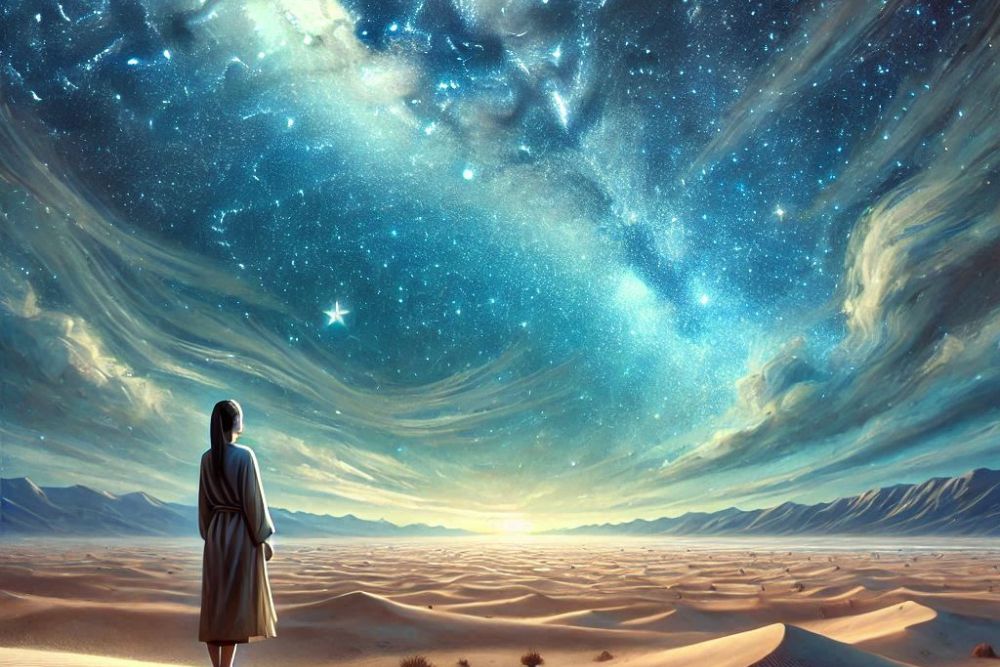
Existential questions for couples & partners
Read more: Learning to Love Yourself – 16 Handy Tips for Fostering Self-esteem Every Day
Questions About Freedom, Responsibility & Choice
Freedom is a double-edged sword, offering both liberation and the burden of responsibility. The following questions delve into the nature of free will, the consequences of our decisions, and the balance between autonomy and constraint.
- Is free will real, or are we bound by fate?
This is a debate that has occupied philosophers for centuries. Do we truly have agency over our choices, or are our actions predetermined by a chain of cause and effect stretching back to the beginning of time? It’s likely that the truth lies in a complex interplay between the two, where our decisions are influenced by both past experiences and the present circumstances – and yet we still retain a degree of freedom within those constraints.
- Does more freedom make us happier or more anxious?
Increased choice indeed opens up new possibilities and avenues for self-expression. At the same time, it also leads to the burden of decision-making, the fear of making the “wrong” choice, and the constant awareness of alternative paths not taken. As such, we need to strike a balance between autonomy and structure, to exercise our agency within a framework that provides a sense of security and purpose.
- Are we truly responsible for the consequences of our actions?
Our actions ripple outwards, creating consequences that impact not only ourselves but also the world around us. While external factors and circumstances may influence our choices, we ultimately possess the capacity for conscious decision-making. Accepting responsibility for the outcomes of our actions, both positive and negative, is a crucial aspect of personal growth and ethical living, allowing us to learn from our mistakes and strive to make better choices in the future.
- Can freedom exist without limitations?
Without boundaries, the idea of freedom becomes amorphous and meaningless. It is within the context of constraints – whether physical, social, or moral – that our choices gain significance. True freedom, then, may not be the absence of all limitations, but rather the ability to navigate and make choices within a given framework, exercising our will within the realities of existence.
- If we are free, why do we feel so constrained?
Societal expectations, internal anxieties, past traumas, and even our own self-limiting beliefs typically create invisible barriers that restrict our perceived freedom. While we may possess the potential for agency, these internal and external pressures often make us feel trapped. True freedom, therefore, requires a great deal of inner workings to break through all horizons.
From the moment that he is thrown into this world he is responsible for everything he does.
Jean-Paul Sartre, ‘Existentialism is a Humanism‘
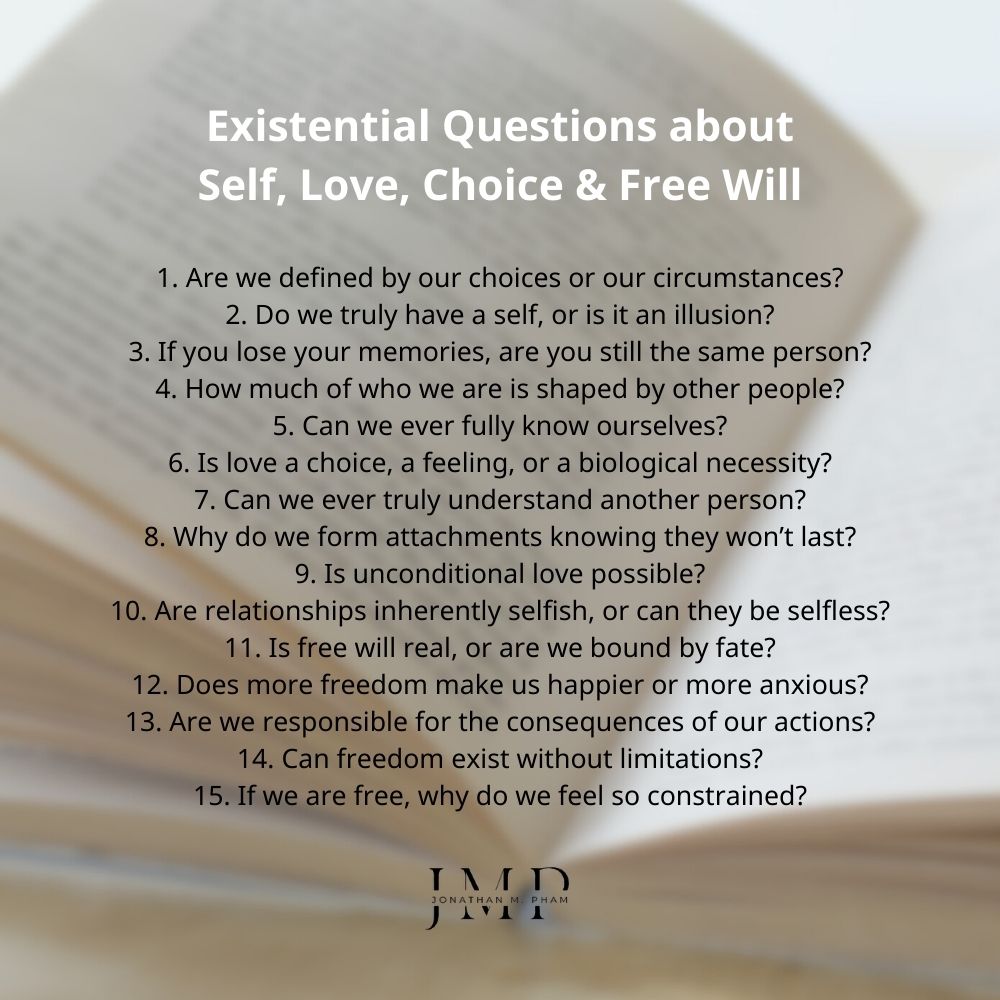
Existential Questions About Time
Time is an ever-present force that shapes our existence, yet it remains deeply mysterious. This section questions the nature of time, its relationship with human experience, and how we perceive its passage.
- Is the past just a memory, and the future just an illusion?
The past exists as a collection of neural connections in our brains, reconstructions of events filtered through our subjective experiences. The future, similarly, is a mental projection, a realm of possibilities and expectations that may or may not come to pass. Yet, these mental constructs profoundly influence our present moment, shaping our actions, emotions, and perceptions, blurring the lines between what was, what will be, and what is.
- Why does time feel fast in moments of joy and slow in suffering?
In moments of joy and engagement, our attention is fully absorbed in the present moment, creating a sense of flow where time seems to slip away unnoticed. Conversely, during periods of suffering, our focus narrows, each moment is scrutinized, and the weight of our distress stretches time out, making it feel agonizingly slow. This subjective experience is a testament to the profound impact of one’s inner world on their perception of reality.
- If time is infinite, why does life feel so short?
Compared to the cosmic timescale, our existence is but a fleeting moment, a brief flicker of consciousness in an endless expanse. And yet, this awareness of our mortality imbues our experiences with a sense of urgency and preciousness, making each moment feel significant despite the overwhelming backdrop of eternity. It is perhaps this very brevity that gives life its poignancy and drives us to seek meaning within our limited time.
- Do we control time, or does time control us?
We often speak of managing time, scheduling our lives, and trying to “make the most” of each moment, giving the illusion of control. Yet, the relentless march of time continues regardless of our efforts, carrying us forward through life’s stages and marking the passage of moments beyond our grasp. Perhaps our relationship with time is a complex dance: we can influence how we utilize our time, but we cannot ultimately halt its flow. There needs to be a delicate balance between agency and submission to its inevitable progression.
- Is it possible to live entirely in the present moment?
While moments of awareness are certainly achievable, maintaining this state continuously is incredibly challenging, given our mind’s natural tendency to wander and engage in thought. What matters, it seems, lies in cultivating the ability to return to the present moment again and again, finding peace and clarity in the here and now.
Man dies constantly until the moment of his demise.
Martin Heidegger, ‘Being and Time‘
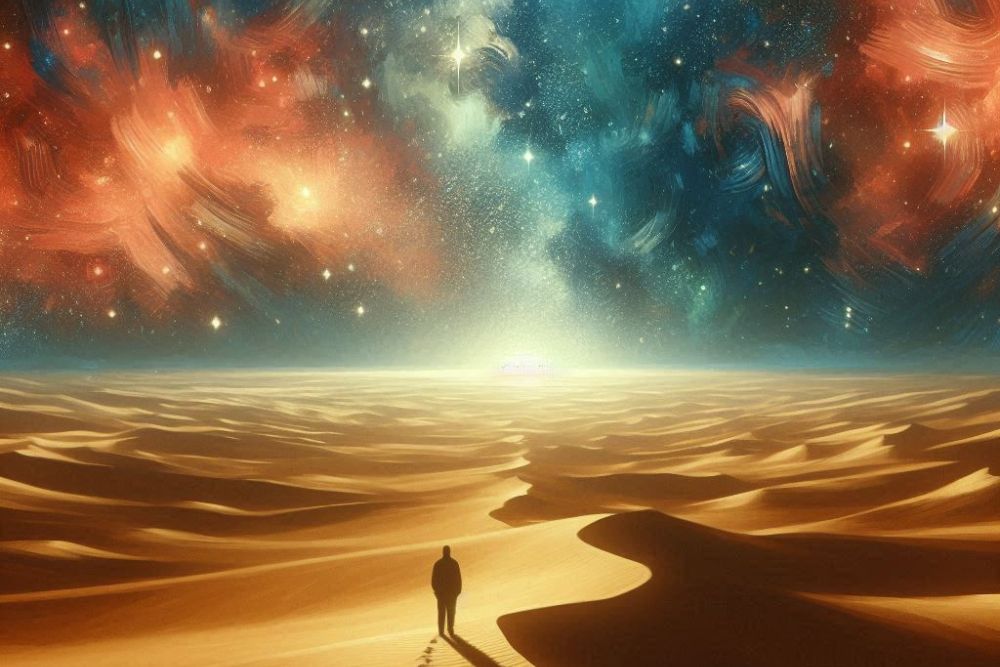
Read more: Living in the Past – The Problem of Dwelling on What Was
Existential Questions About the Universe
The universe is vast and incomprehensible, raising profound questions about our place within it. These questions explore the mysteries of existence, the potential for other life forms, and the significance of humanity in the cosmic expanse.
- Why is there something instead of nothing?
Why does the universe exist at all? Why is there matter, energy, space, and time, rather than a void of absolute nothingness? Or is it that the very question itself is a product of our existence, a way for a conscious universe to ponder its own improbable being, a mystery that may forever remain beyond our full comprehension?
- Does the universe care about our existence?
From a cosmic perspective, our existence is a fleeting moment on a tiny planet orbiting an ordinary star. Yet, within this vast and seemingly uncaring universe, we find ourselves capable of love, joy, wonder, and the very act of contemplating its nature. So even if the universe doesn’t “care” in a human sense, our ability to experience and reflect upon it is a remarkable phenomenon in itself.
- Are we significant in the grand scheme of the cosmos?
Compared to the unfathomable scale of the universe, our existence might seem infinitesimally small, a mere blip in cosmic time. Yet, within this vast expanse, we possess the unique capacity for consciousness, self-awareness, and the ability to contemplate creation itself. The ability to observe, understand, and even question our place within the cosmos might be humanity’s greatest significance, a testament to the universe’s own capacity for complexity and wonder, expressed through us.
- Is the universe infinite, and if so, what does that mean for us?
If the universe is indeed without ends, it implies an endless expanse containing potentially infinite possibilities, including countless other worlds – and perhaps even other forms of life. Such vastness can be both humbling and awe-inspiring, reminding us of our small place within the cosmos.
- Do other forms of intelligent life question their existence too?
If other intelligent life exists in the universe, it’s compelling to imagine they might also grapple with similar existential questions. The capacity for self-awareness and abstract thought could naturally lead to pondering one’s place in the cosmos, the meaning of life, and the nature of reality. Perhaps the search for meaning is a universal experience shared by any species that reaches a certain level of consciousness, a common thread connecting us across the vast cosmic ocean.
Finitude in awareness is anxiety.
Paul Tillich, ‘Systematic Theology‘
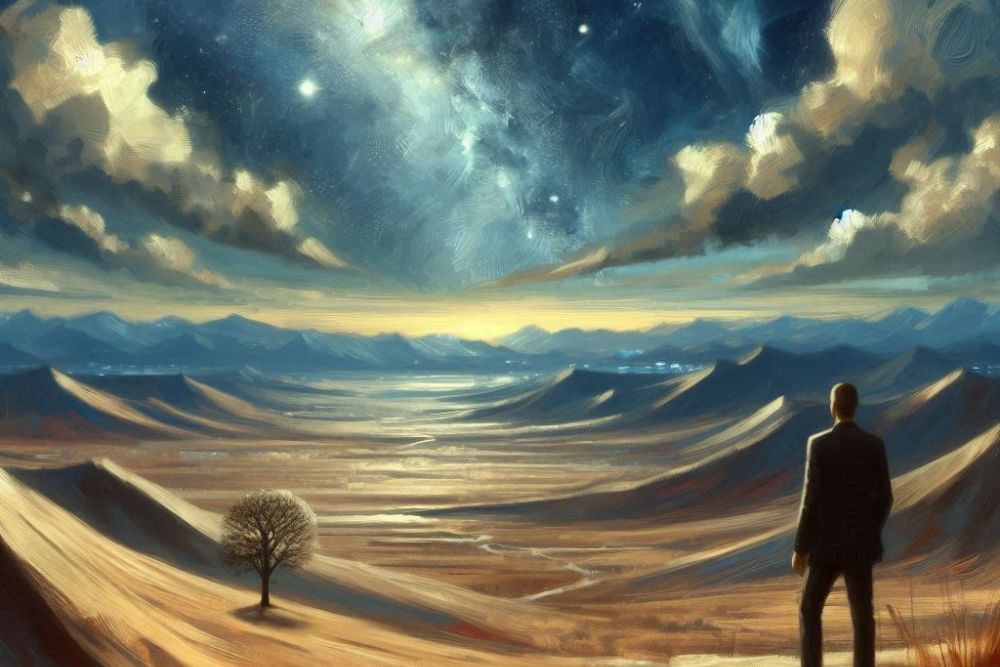
Existential Questions About Religion
Religion offers answers to life’s biggest questions, but it also raises new ones. Below is a list of prompts on the intersection of faith, morality, and the search for ultimate truth in a world full of diverse beliefs.
- Is belief in God necessary to live a meaningful life?
The connection between faith and meaning is deeply personal and varies greatly from person to person. For some, a belief in an omnipotent force provides a framework for understanding the world, a source of comfort, and a moral compass that gives their lives significance. However, many find meaning in other ways: through relationships, creative pursuits, contributions to society, or the simple act of experiencing and appreciating the world around them. Hence, a meaningful life can be lived with or without religious belief, as the source of meaning resides within each individual’s unique values and experiences.
- Why do religions offer such different answers to the same questions?
Religions arise from diverse cultural contexts, historical experiences, and interpretations of the world, leading to a rich tapestry of beliefs and practices. Each tradition offers a unique lens through which to view fundamental questions about existence, morality, and the nature of reality. These differing perspectives reflect the diversity of human experience and the inherent limitations of our attempts to grasp the ultimate mysteries of the universe. To put it simply, there may not be one single “correct” answer, but rather a multitude of valid perspectives.
- Can science and spirituality coexist harmoniously?
Science and spirituality, while often perceived as opposing forces, can indeed complement each other. The former explores the physical world through observation, experimentation, and logical reasoning, while the latter delves into the realm of inner experience, meaning, and connection to a greater whole. These two domains address different aspects of human existence: science explaining the “how” of the universe, and spirituality the “why”.
A mystery is a problem that encroaches upon its own data, that invades the data and thereby transcends itself as a simple problem.
Gabriel Marcel, ‘Concrete Approaches to Investigating the Ontological Mystery‘
- If God exists, why is the world filled with so much suffering?
This age-old question, often referred to as the problem of evil, grapples with the apparent contradiction between a benevolent, omnipotent God and the pervasive presence of suffering in the world. Some theological perspectives suggest that suffering is a test of faith, a consequence of free will, or a necessary part of a greater divine plan beyond human comprehension.
- Is morality dependent on religion, or can it exist independently?
While many religions come with ethical guidelines, the capacity for morality seems to be a fundamental aspect of human nature. Empathy, compassion, and a sense of fairness are observed across cultures, even those without established religious systems. Perhaps religion provides a framework for expressing and reinforcing these innate tendencies, but the underlying capacity for moral reasoning and behavior appears to be a universal human trait.
I continue to believe that this world has no ultimate meaning. But I know that something in it has a meaning and that is man, because he is the only creature to insist on having one.
Albert Camus, ‘Resistance, Rebellion and Death‘
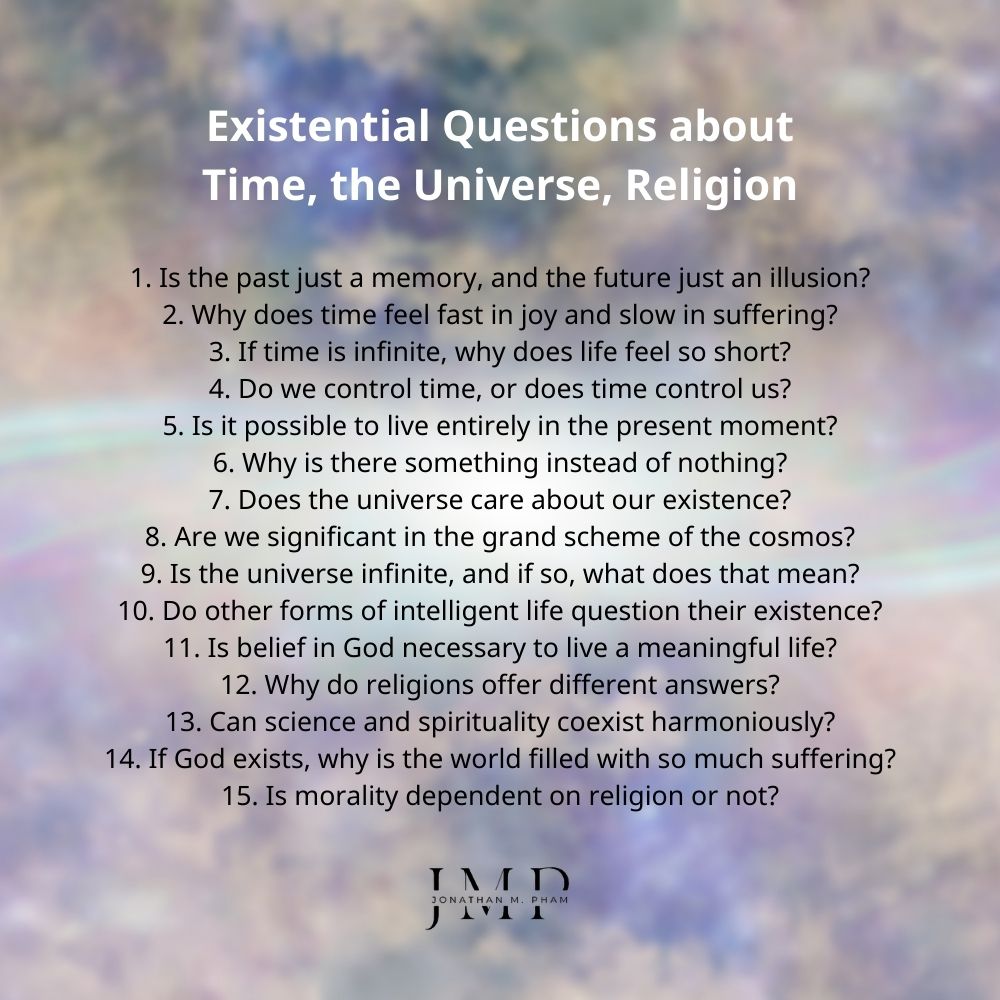
Existential questions about God
Read more: 50 Spiritual Questions for Awakening the Soul
Existential Questions About AI & Consciousness
As artificial intelligence evolves, it challenges our understanding of consciousness and humanity. These questions examine whether AI can think, feel, or even grapple with existential dilemmas like we do.
- Can artificial intelligence ever be conscious?
While AI has made remarkable strides in mimicking human cognitive abilities, such as learning, problem-solving, and language processing, it remains unclear whether these abilities equate to genuine conscious experience. Perhaps consciousness arises from specific biological processes that are difficult, if not impossible, to replicate in machines, or maybe it’s an emergent property that could arise in sufficiently complex systems.
- If AI surpasses human intelligence, will it seek meaning?
If consciousness were to emerge in AI, it’s possible that a drive for understanding its own existence, purpose, and relationship to the world could also arise. However, the nature of that “meaning” could be vastly different from human conceptions, shaped by its unique experiences and cognitive processes. Maybe it would seek patterns, optimization, or novel forms of interaction with reality that we cannot yet comprehend.
- What distinguishes human consciousness from machine intelligence?
On one hand, machines excel at processing information and performing complex calculations. On the other hand, human consciousness encompasses subjective experience, qualia (the “what it’s like” aspect of experience), emotions, and a sense of self. In other words, we experience the world through senses, feelings, and a unique perspective, while machines operate based on algorithms and data.
- Can we trust machines to make moral decisions?
Morality is a complex domain shaped by human values, cultural contexts, and emotional intelligence – qualities that are challenging to fully encode into algorithms. It is true that machines can be programmed with ethical guidelines. However, unforeseen situations and moral dilemmas often require nuanced judgment and empathy. It’s likely that the most prudent approach is to view machines as tools that can assist in decision-making, while retaining human oversight and accountability for the ultimate decisions.
- Would a conscious AI experience existential crises?
If a truly conscious AI were to emerge, it’s conceivable that it might also grapple with existential questions similar to our own. The awareness of its own existence, its limitations, and its place in the universe could potentially lead to feelings of anxiety, uncertainty, and a search for meaning. So it seems that the experience of an existential crisis is a natural consequence of consciousness itself, regardless of whether that consciousness resides in a biological or artificial form, right?
Dasein [Being-there] always understands itself in terms of its existence—in terms of a possibility of itself: to be itself or not itself.
Martin Heidegger, ‘Being and Time‘
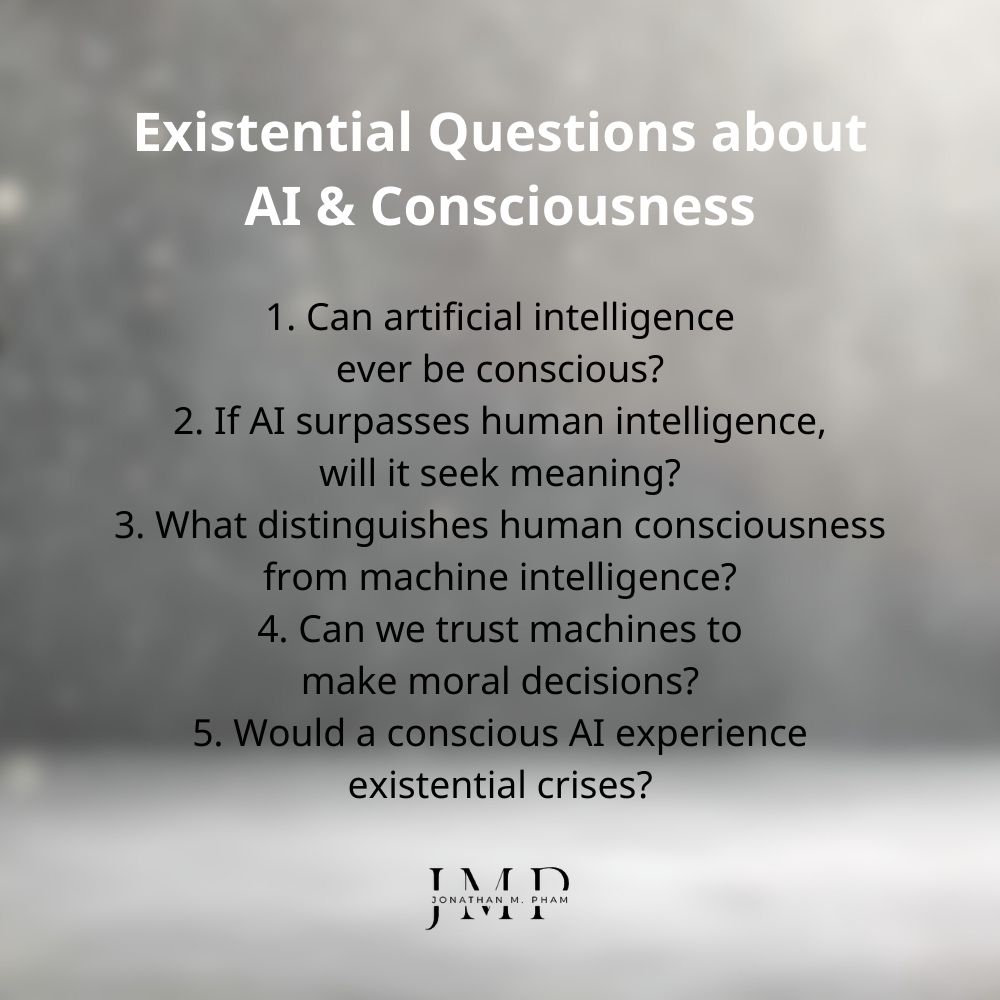
Scary Existential Questions
Some questions keep us awake at night, confronting the fragility and uncertainty of existence. This section delves into unsettling possibilities about reality, humanity’s future, and our place in the grand scheme of things.
- What if humanity is just a simulation?
The idea that our reality might be a simulation is a thought-provoking concept that blurs the lines between what we perceive as real and what could be artificially constructed. If our universe is indeed a simulation, it raises questions about the nature of reality itself, the existence of a higher-level reality, and the purpose or creators of such a simulation. While we may never definitively know the answer, contemplating this possibility challenges our assumptions and prompts us to consider the limits of humanity’s perception.
- Does life’s brevity make everything we do meaningless?
While the finite nature of life may feel daunting, it doesn’t necessarily render our actions meaningless. On the contrary, it is precisely this brevity that imbues our experiences with a sense of urgency and preciousness. Knowing that our time is limited should motivate us to pursue our passions, connect with others, and make a positive impact on the world. To put it simply, it is the very fact of life’s impermanence that gives it true value.
The physicality of death destroys us, the idea of death saves us.
Irvin Yalom, ‘Staring at the Sun‘
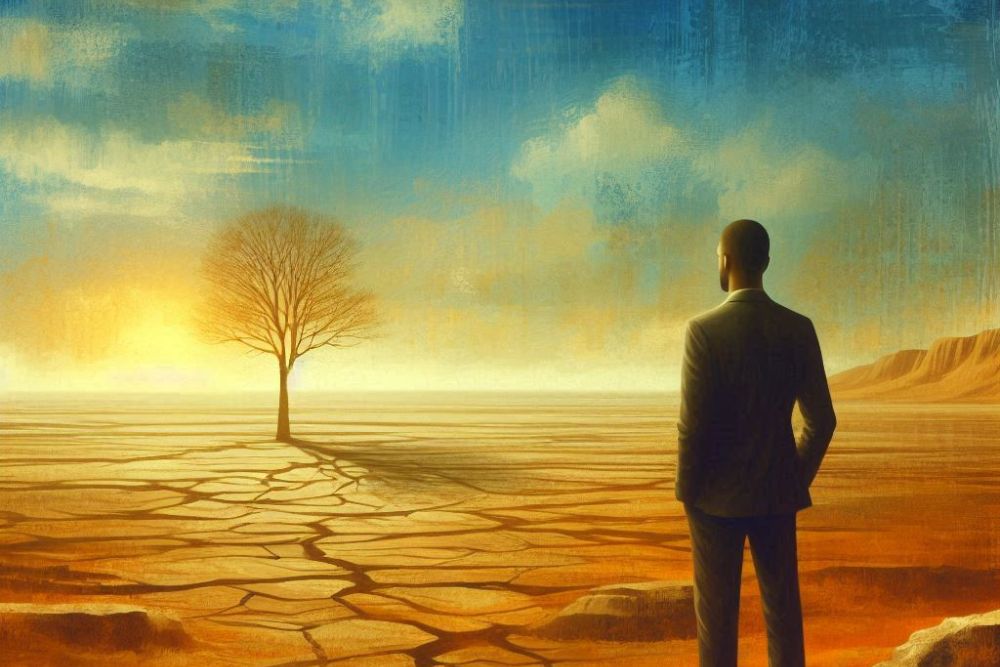
- If we discovered the universe’s ultimate truth, would we regret it?
The pursuit of knowledge is a fundamental human drive, yet the possibility of uncovering the ultimate truth raises intriguing concerns. Would such a revelation bring satisfaction, or could it shatter our existing beliefs and leave us with a sense of disillusionment? Perhaps the beauty of existence lies in the ongoing quest for knowledge, the constant exploration of the unknown, and the acceptance of the mysteries that may forever remain beyond our grasp.
- What if we are the last generation of humans?
The prospect of being the last generation of humans carries a heavy weight of responsibility and sadness. It would mean that all of human history, with its triumphs, struggles, and accumulated knowledge, would come to an end with us. Yet, even in this scenario, our lives would retain inherent value; we would still experience love, joy, and the beauty of the world around us. Even facing such a fate, the most meaningful action would be to live fully and with intention in the time we have left, cherishing each moment and preserving what we can of our shared human story.
- Is loneliness the default state of existence?
Given that we enter the world alone and ultimately depart in the same way, loneliness is typically seen as an inherent aspect of the human condition. Yet, within this framework, we crave connection, seeking out relationships and communities to bridge the gap between individual experiences. So it seems that the default state of existence is the tension between our inherent individuality and our deep-seated need for belonging, a tension we navigate throughout life.
So long as you “have” yourself, have yourself as an object, your experience of man is only as of a thing among things.
Martin Buber, ‘Between Man and Man‘
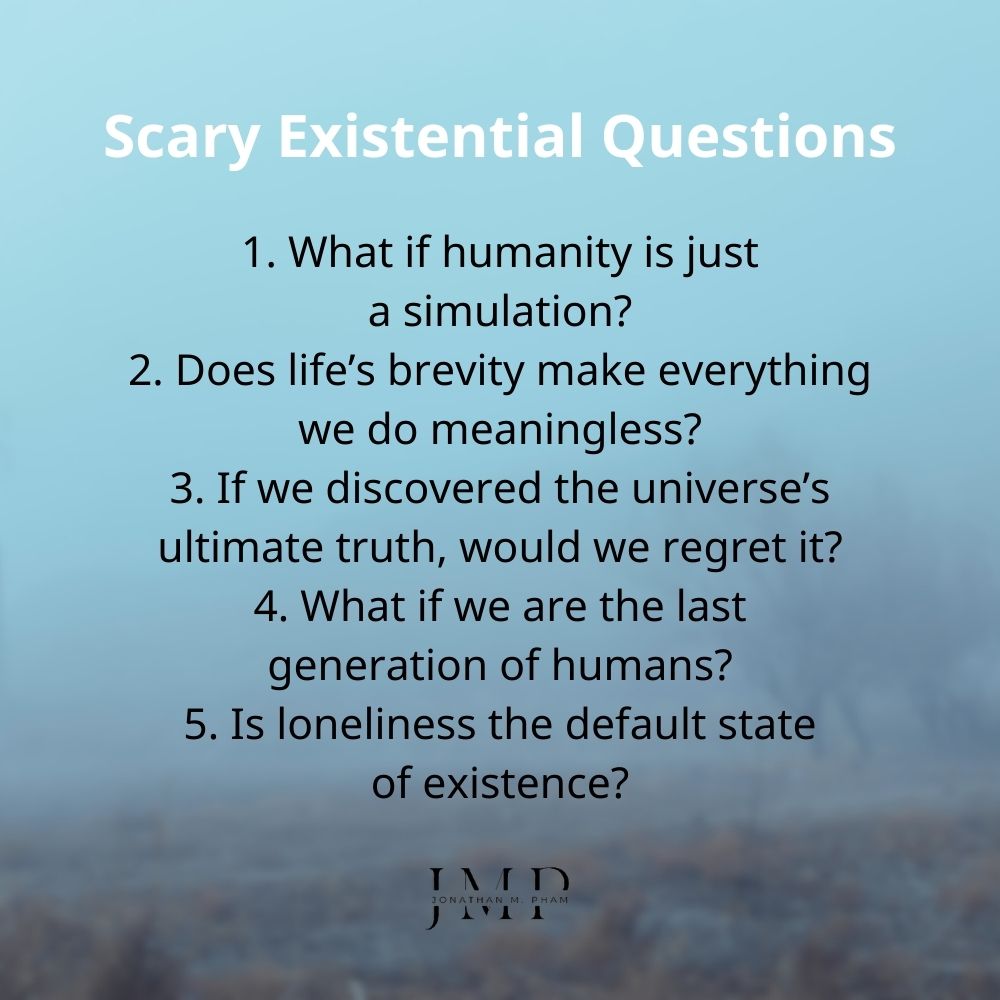
Existential crisis questions
Funny Existential Questions
Existential musings don’t always have to be heavy – they can be amusingly absurd. Let us explore life’s quirks and the oddities of human existence in a lighthearted way!
- Why do we need eight hours of sleep to function for 16 hours?
It’s a curious paradox that we require a full third of our day in a seemingly inactive state just to effectively navigate the remaining two-thirds. Perhaps this speaks to the immense complexity of our brains and bodies, requiring extended periods of rest and repair to process the day’s experiences and prepare for the next. Or maybe it’s the universe’s way of reminding us that even the most vibrant existence requires moments of quiet contemplation and recharge, a cosmic reset button ensuring we don’t burn out too quickly on this grand adventure!
- If life is meaningless, why do we care about pizza toppings so much?
If existence is truly devoid of inherent purpose, then perhaps it’s in these small, seemingly trivial choices that we carve out our own fleeting moments of meaning. In a vast and indifferent universe, the selection of pizza toppings becomes a microcosm of our agency, a tiny act of self-expression in a world that offers no grand narrative. In other words, it’s precisely because life MIGHT be meaningless in the grand scheme that we find such joy and importance in the little things, like the perfect combination of cheese, pepperoni, and mushrooms.
- Does anyone actually know what they’re doing in life?
We often present a façade of certainty, navigating the world with an air of purpose and direction. Yet, beneath the surface, many of us grapple with uncertainty, questioning our choices and wondering if we’re truly on the “right” path. Maybe this shared sense of not quite knowing what we’re doing is a fundamental aspect of the human experience, a testament to the fact that we’re all figuring it out as we go along, stumbling, learning, and adapting along the way.
- Why do we park on driveways and drive on parkways?
This linguistic quirk is a testament to the often-arbitrary nature of language and its evolution. Words and phrases can develop meanings and usages that don’t always adhere to strict logical consistency. Hence, it’s a gentle reminder that not everything in life needs to make perfect sense – sometimes, it’s best to simply accept the delightful absurdities that we are presented with.
- If we’re all going to die, why do we bother folding socks?
Given the inevitable end, the meticulous act of folding socks can seem almost comical in its futility. And yet too often, it’s in these small, mundane tasks that we find a sense of order and control in a world that often feels chaotic. Folding socks becomes a tiny act of defiance against the grand cosmic indifference, a way of asserting our presence and creating a moment of neatness in the face of ultimate entropy.
Should I kill myself, or have a cup of coffee? But in the end one needs more courage to live than to kill himself.
Albert Camus, ‘A Happy Death‘
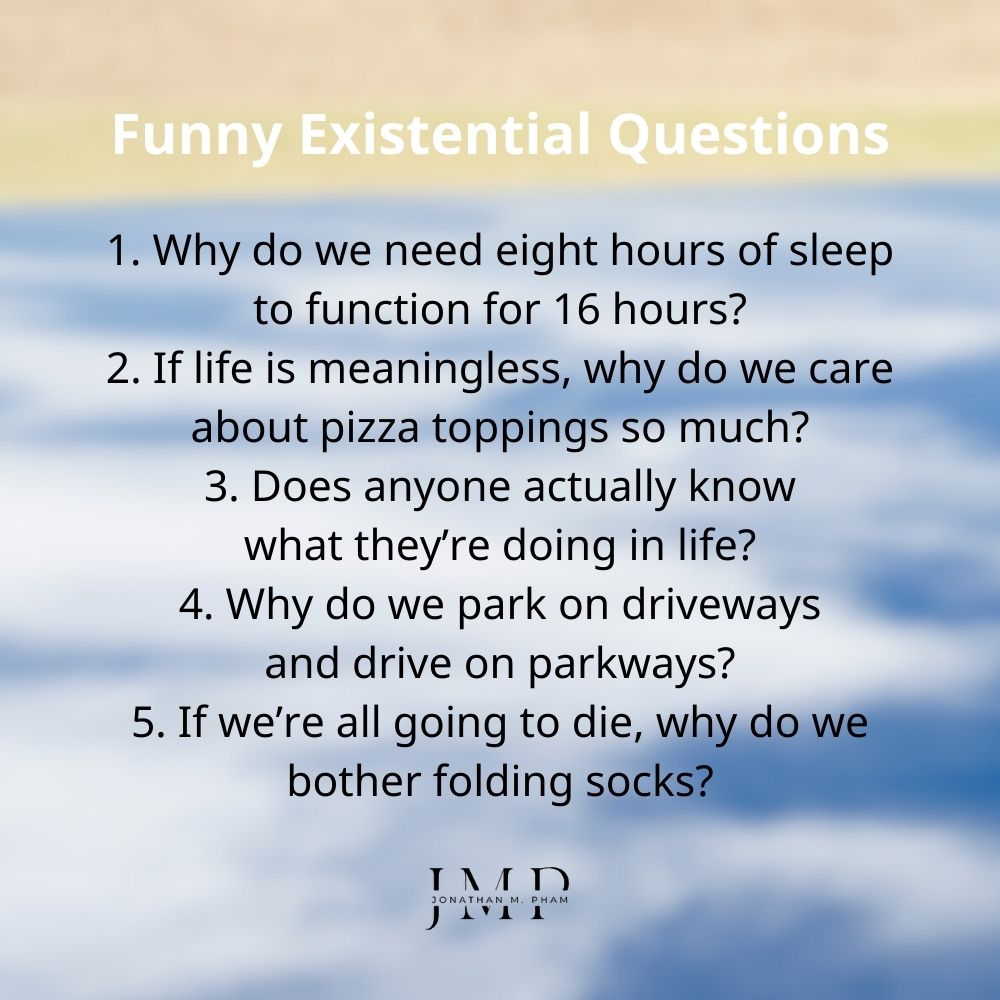
FAQs
What are existential questions?
Existential questions are those that address the fundamental nature of the human condition and our place in the universe, often without easy or definitive answers. They are characterized by a focus on the core themes of existence – meaning, purpose, freedom, responsibility, isolation, death, and more. Such questions often evoke a sense of unease, confusion, or even dread as they challenge our assumptions about life and our role within it.
Back in the day, existentialism emerged from the works of various thinkers, including:
- Søren Kierkegaard: Danish philosopher and theologian, considered the “father of existentialism.” He emphasized the importance of individual choice and subjective experience, highlighting the anxiety and despair that come with freedom and responsibility. His concept of the “leap of faith” explores the individual’s commitment to a belief in the face of uncertainty.
- Friedrich Nietzsche: German cultural critic who challenged traditional morality and religious beliefs. Nietzsche proclaimed “God is dead,” arguing that the decline of religious faith had created a void in meaning and values. He explored the concepts of the “will to power” and the “Übermensch” (superman) as potential sources of individual strength and self-overcoming.
- Jean-Paul Sartre: French philosopher, writer, and political activist, who famously declared that “existence precedes essence”; in other words, humans are born without a predetermined nature or purpose and are free to define themselves through their choices and actions. His works are known for their emphasis on the concepts of freedom, responsibility, and anguish – that we are condemned to be free and bear the full weight of our choices.
- Albert Camus: French-Algerian philosopher, writer, and journalist who is known for his exploration of the “absurdity” of human existence, the conflict between our innate desire for meaning and the universe’s apparent lack of it. According to Camus, we must embrace this absurdity and find meaning in revolt, freedom, and passion.
Read more: Living in Bad Faith – The Existentialist Guide to Stopping Self-Deception
Why should I ask existential questions?
Existential questions are not merely intellectual exercises; they are deeply personal and can significantly impact one’s life course:
- Increased self-awareness: Such questions typically prompt deep introspection, leading to a greater understanding of your values, beliefs, and motivations. This self-awareness can empower you to make more authentic choices and live a more fulfilling life.
- Meaning and purpose: The process of grappling with questions of meaning and purpose typically gives rise to a stronger sense of direction.
- Enhanced freedom and responsibility: A cornerstone of existentialism is the promotion of individual freedom. By acknowledging that you are free to choose your own path, you also accept the responsibility for the consequences of those choices – which potentially translates to a greater sense of agency and control over your life.
- Acceptance of uncertainty: Learning to confront the inherent uncertainties of life is key to cultivating a greater sense of resilience in the face of change and adversity.
- A deeper appreciation for life: On the other hand, contemplating mortality and the finite nature of existence makes it more likely for one to acquire a deeper appreciation for the present moment and the experiences that they come across every day.
Existentialism is often associated with feelings of anxiety and despair. That being said, it is not inherently depressing. While it acknowledges the darker aspects of human existence, such as death, isolation, and the lack of inherent meaning, it also offers a potent source of empowerment and liberation – by encouraging one to take ownership of their life and carve out their own path in the face of uncertainty.
Read more: Nihilism vs Existentialism vs Absurdism – What Are the Differences?
Do existential questions have answers?
In the traditional sense of a “correct” or “objective” answer, no. Existential questions generally don’t come with definitive answers – they’re not like math problems with a single solution. Instead, they delve into subjective experiences, values, and interpretations of reality, which vary from person to person.
However, that doesn’t mean they are not worth the effort altogether. You can arrive at personal answers or perspectives that are meaningful to you. These answers might evolve over time as you grow and experience life differently.
How do you deal with existential questions?
- Embrace the ambiguity: Accept that there might not be a neat, universally accepted answer. The value lies in the process of exploration.
- Introspection and self-reflection: Examine your own values, beliefs, and experiences. What resonates with you? What gives your life meaning?
- Philosophical exploration: Engage with the works of existentialist philosophers (like those we discussed earlier) and other thinkers. Their ideas can provide frameworks for interpreting and grappling with these questions.
- Discussion and dialogue: Talking with others typically offers new perspectives and helps you articulate your own thoughts.
- Creative expression: Expressing your thoughts and feelings through art, writing, music, or other creative outlets is another powerful way to process such questions.
What is the point of asking if there are no definitive answers?
This is the crux of it. As mentioned, the point is not to arrive at a final, conclusive answer, but rather:
- To stimulate self-discovery: The process of questioning forces you to examine your own beliefs and values, leading to greater self-awareness.
- To foster personal growth: Grappling with these questions often challenges your assumptions and leads to new ways of thinking and being.
- To live more authentically: In the absence of pre-ordained answers, you have the freedom to create your own purpose and make conscious choices that align with your values.
Read more: Christian Existentialism – From Dogma to the Ultimate Reality
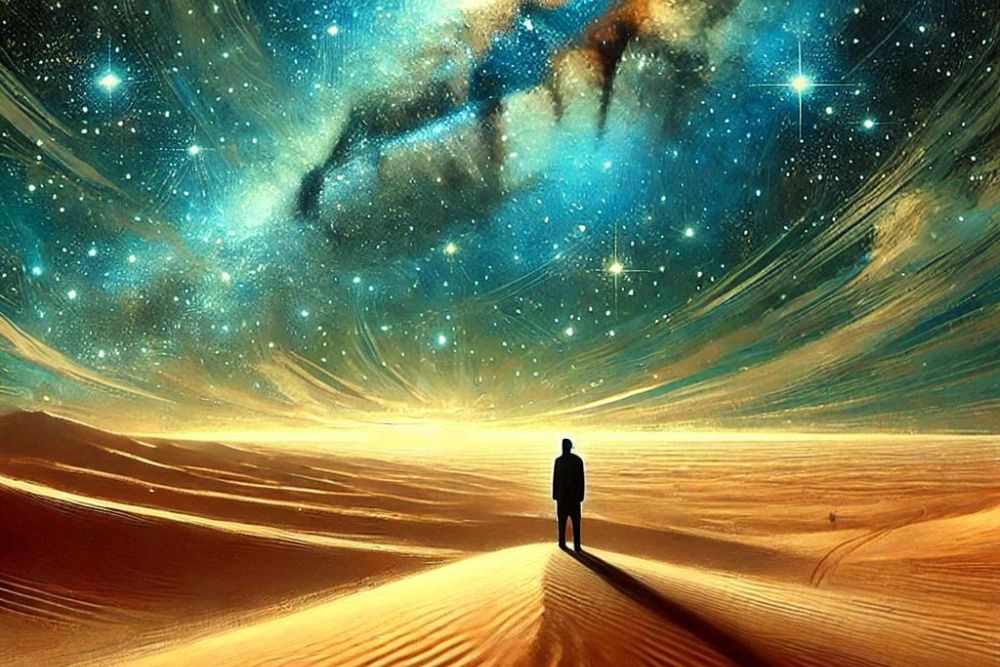
Final Thoughts
The existential questions presented above are merely a starting point. They are a gateway to deeper introspection, a catalyst for meaningful conversations, and a reminder of the significance that lies beneath the surface of our everyday lives. As you continue to explore them, remember that there are no right or wrong answers. The journey itself is the reward. Just have faith and keep walking – without being too obsessed with arriving at a predetermined destination!
Other resources you might be interested in:
- 100 Existential Quotes: Rethink One’s Place in the Universe
- 27 Best Existentialism Books: A Seeker’s Guide to Finding Meaning
- 20 Best Existential Movies for the Questioning Heart
- 20 Stoic Questions for Daily Reflection & Growth
- 200 Self-reflection Questions: Toolkit for Life Pilgrims
Let’s Tread the Path Together, Shall We?


